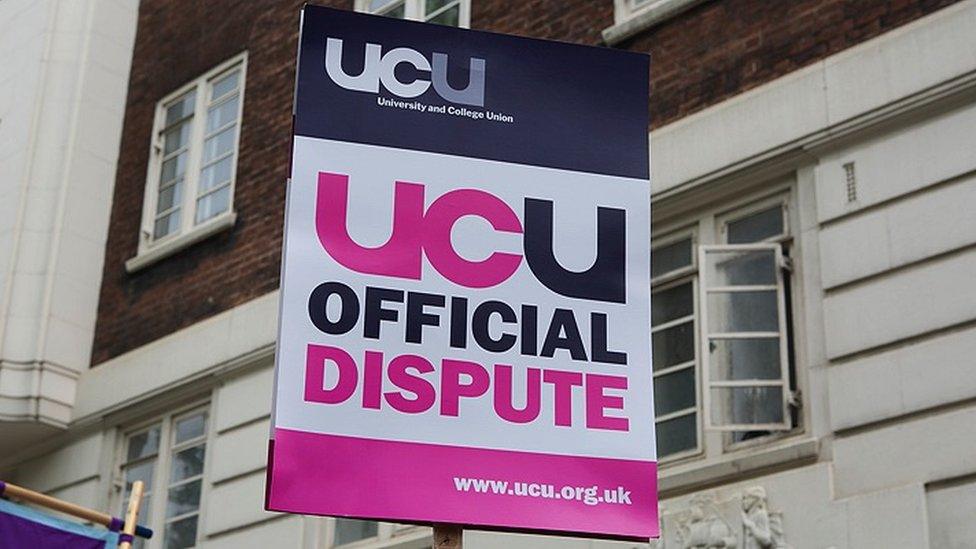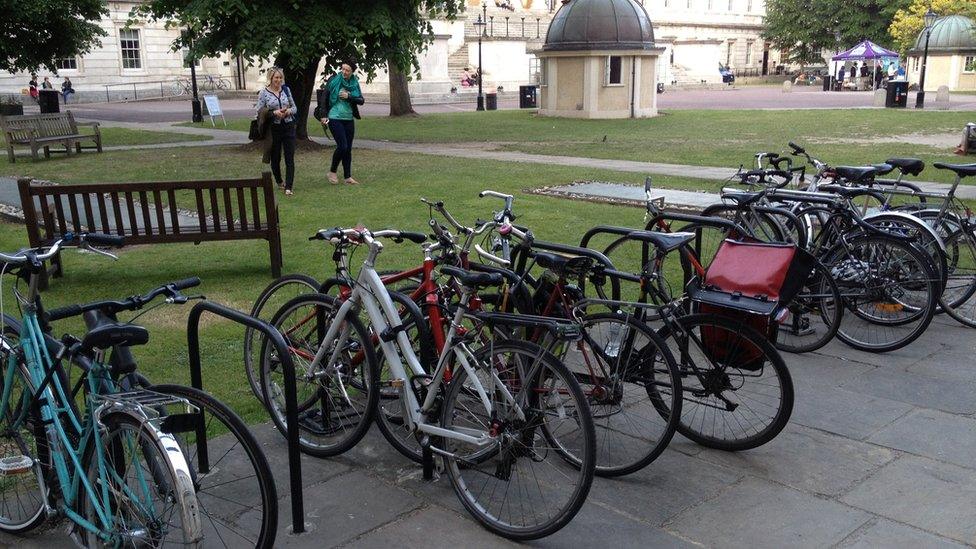University strike: What's it all about?
- Published

University staff at 64 universities are striking over pensions. More than one million students are expected to be affected, with lecturers not teaching, marking or carrying out research. There are no plans to reschedule cancelled lectures.
Why are lecturers striking?
Academics who are members of the University and College Union are angry at proposed changes to their pensions, which they say could leave them up to £10,000 a year worse off in retirement.
Their employers, Universities UK, want to change the Universities Superannuation Scheme from a defined benefit scheme - giving a guaranteed retirement income - to a defined contribution scheme, where their pensions would be subject to changes in the stock market.
Younger staff would be worst affected, says the union, with some losing up to half their pensions.
Why do the employers say the changes are necessary?
Universities UK say the scheme has a deficit of more than £6bn and they have a legal duty to put in place a credible plan to reduce the deficit by this summer.
They argue that, without reform, pension contributions from employers and staff would have to rise steeply. This would mean cuts to other spending by universities - on teaching, research and student support. It could even lead to redundancies, says UUK.
UUK says that even after the changes the scheme will compare well, with employer contributions double the private sector average.

Why are only 64 out of the UK's 130 universities affected?
Staff at 68 universities founded before 1992 are members of the Universities Superannuation Scheme. In January UCU members at 64 universities balloted in favour of action over the proposed pension changes.
Most academic staff at institutions which became universities after 1992 are members of the Teachers' Pension Scheme, which is unaffected by this dispute.
What about students?
About 80,000 students at 30 of the universities affected have signed petitions, broadly supportive of their lecturers but asking for compensation for the hours of tuition they will miss because of the strikes.
Students who pay fees - if they are from England, it's £9,250 a year - have rights under consumer law, although how far these rights apply to industrial disputes is untested.
On Sunday England's universities minister, Sam Gyimah told BBC Radio 5 Live's Pienaar's Politics it was up to individual institutions whether they paid compensation but students had rights that should be taken into account.
Robert Liow, a third year law student at Kings College London argues that if universities do not refund students part of their fees they will be profiting from the dispute as they will gain money from not paying striking lecturers.
"I don't want a consumerist education service. I believe education is a public good and not a service to be sold. But if we are going to be treated as consumers we are going to ask for our money back."
He says if the dispute continues into the exam season, international students could be badly affected.
Some fear they might not be able to finish their studies before their visas run out.
In February a poll of 1,500 students for Times Higher Education magazine, external found over half (51.8%) would support their lecturer in a walk-out and just under a third (29.3%) would not.
Support for the national strike was evenly balanced, with 38.4% in favour and 38.4% against.
Georgia Davis, a third year English and modern history student at St Andrew's University said some students were simply furious at their lecturers for letting them down - but many sympathised with their predicament.
"We want tutors to have the pensions they deserve, but we also want to get the education we're paying for.
"While staff are striking, we are giving up a massive portion of our tuition fees in the loss of contact time as a result", she argues in a piece for The Tab, student newspaper, external.
"I am absolutely entitled to try and get the money back," she says.

Is there any sign of compromise?
Not much so far. Both sides dispute each others' figures.
The union says the existing pension scheme is performing well, with member contributions more than covering pension payments. They say the method used for UUK's evaluation of the scheme is "recklessly prudent" and creates a huge artificial deficit. They want the evaluation done again, using a less cautious method.
UUK says it is "inaccurate and misleading" for the union to suggest the evaluation is overly prudent. They also dispute UCU's calculations on how much staff will lose under the changes.
Both sides say they are keen to continue negotiations.
Universities UK says it "remains at the negotiating table", accusing the union of refusing to engage on how best to ensure the scheme's long-term sustainability.
For its part, the union accuses UUK of trying to impose the changes without compromise.
General Secretary Sally Hunt says the key is how universities react to the first five days of strikes, and UCU is planning a meeting to consider further moves at the end of next week.
"We doubt any universities want a prolonged dispute that carries on towards exam season and would urge vice-chancellors to put pressure on Universities UK to get back round the table with us."
Are all universities in agreement?
Apparently not.
About 10 university vice chancellors are taking a more doveish approach to the dispute, calling for fresh talks with the union and some arguing for compromise.
In a letter to Universities UK, Peter Piot, director of London School of Hygiene and Tropical Medicine, urged "a further actuarial valuation of the scheme".
And, in a statement, Anthony Forster, vice-chancellor of Essex University said: "university employers must step up to the plate and commit to increasing employer contributions to the scheme".
"Principled compromise is the answer," he argued.
And there are hawks too, with City and Reading universities telling staff they could be included in any legal action for compensation taken by students.
"The university further reserves the right to join you as a party to any claim for breach of contract brought against the university as a result of this action," said Reading's director of human resources in a letter to staff.
While Mary Luckiram, who holds the same position at City, warned staff they could be "personally liable for any damages awarded in those claims".